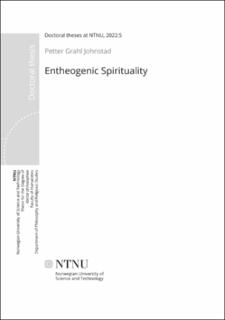| dc.contributor.author | Johnstad, Petter Grahl | |
| dc.date.accessioned | 2022-02-18T10:28:37Z | |
| dc.date.available | 2022-02-18T10:28:37Z | |
| dc.date.issued | 2022 | |
| dc.identifier.isbn | 978-82-326-5672-1 | |
| dc.identifier.issn | 2703-8084 | |
| dc.identifier.uri | https://hdl.handle.net/11250/2979984 | |
| dc.description.abstract | Avhandlingen presenterer og diskuterer ulike studier i det jeg har kalt enteogen spiritualitet. Slik disse studiene har forstått saken, handler enteogen spiritualitet om bruk av rusmidler som LSD, psilocybin, DMT, MDMA og cannabis i uformelle sammenhenger men med spirituell hensikt. Enteogene opplevelser er knyttet til innsikt, positivitet og forbedrete relasjoner, samt noen ganger til ego-oppløsning og en følelse av kontakt med transcendente størrelser. Den innledende oversikts-artikkelen i avhandlingen diskuterer hvordan disse studiene bidrar til en forbedret forståelse av hva religion er, samt av forholdet mellom religion og makt. Som en i hovedsak ikke-institusjonell form for religion bryter enteogen spiritualitet med forståelsen av religion som et institusjonelt fenomen, men denne formen for spiritualitet kan dog forstås i relasjon til diskurs, praksis, samfunn og opplevelse. Siden enteogener tilsynelatende er meget effektive i å indusere spirituelle opplevelser og slike opplevelser kan fungere som en kilde til spirituell autoritet, argumenterer jeg for at enteogen spiritualitet kan utfordre etablerte religioners (i hovedsak) institusjonelt baserte autoritet, og dermed også deres makt. Denne posisjonen som en potensiell kilde til motmakt overfor etablerte religioner kan hjelpe oss å forstå hvorfor enteogen spiritualitet er den eneste storskala spirituelle bevegelse i den moderne verden som er forbudt etter internasjonal lov. | en_US |
| dc.description.abstract | This dissertation presents and discusses a range of articles related to studies in entheogenic spirituality. As these studies have understood the matter, entheogenic spirituality is a phenomenon involving the use of entheogenic drugs – LSD, psilocybin, DMT, MDMA, and cannabis – in informal settings for spiritual purposes. It is connected to entheogenic experience, but also to the integration of experience for purposes of personal growth. The most common characteristics for entheogenic experiences were connected to insight, positive feelings, and improved connections to other people and to nature. Experiences with mystical-type characteristics such as ego dissolution and unification with transcendent forces were important to many spiritual entheogen users, but not to everybody, and rarely to spiritual cannabis users.
The individual articles relate the specific findings they discuss to extant research, although most of this research has been performed by academics working in fields outside the Study of Religions. There is also a small but growing literature on entheogenic spirituality by scholars of religion, however, and the overview article discusses how my research relates to this literature. In addition, it discusses the issue of how entheogenic spirituality challenges our understanding of religion in an overall sense, and particularly from the perspective on the relationship between religion and power. As a largely non-institutionalized form of religion, entheogenic spirituality does not conform to an understanding of religion as involving institutions. Nevertheless, it can be understood in relation to discourse, practice, community, and experience as a form of institution-less religion. Since entheogens are apparently highly efficacious means of inducing experiences with mystical-type characteristics, furthermore, and since such characteristics may serve as a basis for claims to spiritual authority, entheogenic spirituality has the apparent capacity to challenge the authority and power of religious institutions. The overview article discusses how a power-centric perspective on religion may help us understand both the position of entheogenic spirituality in modern western societies and the position of studies in entheogenic spirituality in the modern academy. | en_US |
| dc.language.iso | eng | en_US |
| dc.publisher | NTNU | en_US |
| dc.relation.ispartofseries | Doctoral theses at NTNU;2022:5 | |
| dc.relation.haspart | Paper 1: Johnstad, Petter Grahl. Who is the typical psychedelics user? Methodological challenges for research in psychedelics use and its consequences. Nordic Studies on Alcohol and Drugs 2021 ;Volum 38.(1) s. 35-49 | en_US |
| dc.relation.haspart | Paper 2: Johnstad, Petter Grahl. Entheogenic spirituality: Exploring spiritually motivated entheogen use among modern westerners. Journal of Ethnographic & Qualitative Research, 2018, 12, 244–260. This paper is not included due to copyright restrictions. | en_US |
| dc.relation.haspart | Paper 3: Johnstad, Petter Grahl. Entheogenic experience and spirituality. Methods and Theory in the Study of Religion, 2021, 33(5), 463–481. This paper is not included due to copyright restrictions. Available at: https://doi.org/10.1163/15700682-12341512 | en_US |
| dc.relation.haspart | Paper 4: Cannabis as entheogen: Survey and interview data on the spiritual use of cannabis. Journal of Cannabis Research, 2020, 2(30), 1–17 | en_US |
| dc.relation.haspart | Paper 5: Johnstad, Petter Grahl. How to disappear completely: Entheogen-induced experiences of selfdissolution, 2021. Manuscript submitted for publication. | en_US |
| dc.relation.haspart | Paper 6: Johnstad, Petter Grahl. Entheogenic spirituality: Characteristics of spiritually motivated psychedelics use, 2021. Manuscript submitted for publication. | en_US |
| dc.title | Entheogenic Spirituality | en_US |
| dc.type | Doctoral thesis | en_US |
| dc.subject.nsi | VDP::Humaniora: 000::Teologi og religionsvitenskap: 150 | en_US |

